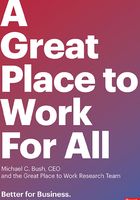
Introduction:A Great Place to Work For All
What was good enough to be “great” 10 or 20 years ago is not good enough now. To survive and thrive in the future, organizations have to build Great Places to Work For All.
Like other business leaders, John Chambers likes to win.
But his way of winning is different.
We recently spoke with the longtime CEO of tech giant Cisco Systems, and his face lit up when he talked about outlasting rival networking firms and the thrill of outmaneuvering business opponents by thinking ahead.
“The chess game is fun,” said Chambers, who stepped down from the CEO post three years ago but remains at Cisco as executive chairman. “I never make the first move on the chessboard until I’ve already played the game forward and backward.”
He plays it well. During Chambers’ 20 years as CEO, Cisco’s annual revenue soared from $1.2 billion to $47 billion, the company laid the plumbing for the modern Internet, and Business Insider named it one of the “Greatest Tech Companies in History.”
So, in many ways, Chambers is the quintessential take-charge, no-nonsense, play-to-win business executive. But something sets him apart. Unlike most business leaders of his era, Chambers realized early on that a key to winning as a leader is tapping your people power—that is, creating a great place to work, where people bring their best selves to the organization.
Chambers calls it “culture,” or you might call it the queen piece in his chess matches. “While some people view culture as not a key ownership requirement for the CEO, I respectfully disagree,” he said. “I think it is the foundation.”
Chambers’ focus on culture is why Cisco has been a mainstay on the 100 Best Companies to Work For list we publish each year with our partner FORTUNE magazine. Cisco, in fact, is one of the 12 “Legend” companies that earned a place on our list each of the first 20 years we produced it.
At a recent Great Place to Work For All conference, Chambers spoke from the main stage to our “choir”—the community of companies that already get the importance of a great culture. But he had a sermon about the emerging digital economy that shook people up.
The speed of change is accelerating, Chambers said. And that means, more than ever, everyone in the organization counts. Companies won’t be able to win if they wait for senior executives to learn about problems and make decisions. Today, there are 17 billion devices connected to the Internet, Chambers said, and that number will explode to 500 billion in 10 years, meaning companies will have to make sense of unprecedented amounts of data. “You’re going to have information coming into your company in ways you never imagined before,” he said. “Decisions will be made much further down in the organization at a fast pace.”
The upshot of his message is agility and success in today’s chess matches require getting all your people into the game—making decisions rather than serving as passive pawns.
What John Chambers told our conference audience gets at the heart of this book. What was good enough to be great 10 or 20 years ago is not good enough anymore.